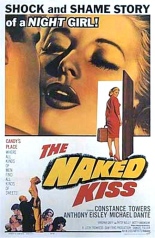
 Certainly it’s no accident that Sam Fuller set the powerhouse opening of The Naked Kiss on the Fourth of July, because it’s full of fireworks. Prostitute Kelly (Constance Towers) swings punches toward the camera, and that’s even before her pimp rips off her wig to reveal a bald scalp beneath. The visual manliness suits the whoop-ass she delivers. Once he’s knocked out cold, she takes the $75 she’s owed, reassembles herself and leaves.
Certainly it’s no accident that Sam Fuller set the powerhouse opening of The Naked Kiss on the Fourth of July, because it’s full of fireworks. Prostitute Kelly (Constance Towers) swings punches toward the camera, and that’s even before her pimp rips off her wig to reveal a bald scalp beneath. The visual manliness suits the whoop-ass she delivers. Once he’s knocked out cold, she takes the $75 she’s owed, reassembles herself and leaves.
Two years later, Kelly steps off the bus into the idyllic town of Grantville, and right into bed with an eager customer, asshole Capt. Griff (Anthony Eisley, The Wasp Woman). Immediately, she swears to go straight. Instead of enlisting at the whorehouse across the river, she lands a job she loves, working with handicapped children at an orthopedics hospital. She also falls in love with the town playboy philanthropist Grant (Michael Dante, Willard), who’s Griff’s best bud; equally smitten, Grant proposes marriage.
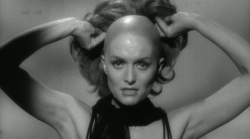 Can life be happily ever after for Kelly? Are you kidding? This is Sam Fuller we’re talking about here, and The Naked Kiss is not only his follow-up to the previous year’s Shock Corridor, but thematically, its first cousin. They share an overall strange vibe, as if a regular noir film got slipped a mickey, and a shocking-for-their-time subplot of deviant sexuality.
Can life be happily ever after for Kelly? Are you kidding? This is Sam Fuller we’re talking about here, and The Naked Kiss is not only his follow-up to the previous year’s Shock Corridor, but thematically, its first cousin. They share an overall strange vibe, as if a regular noir film got slipped a mickey, and a shocking-for-their-time subplot of deviant sexuality.
Only several jarring edits make Kiss the technically inferior work, but Towers being put front and center elevates this into the superior territory for me. Giving one hell of a performance that should have earned her an Oscar nomination, she supplies just the right amount of honor and histrionics. Kelly is not a “hooker with a heart of gold” character, either, but one who leaves Grantville with far more baggage than she brought. —Rod Lott


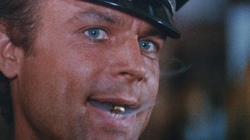

 Why is it that most triptych flicks seem to place the weakest segment in the middle? Such is the case with “Merde.” From Leos Carax (
Why is it that most triptych flicks seem to place the weakest segment in the middle? Such is the case with “Merde.” From Leos Carax (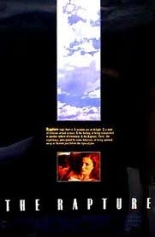
 Unable to kill herself, she is saved from imprisonment by the titular event, only to face the near-impossible choice of loving the deity who caused her so much pain or spending the rest of eternity in desolate isolation.
Unable to kill herself, she is saved from imprisonment by the titular event, only to face the near-impossible choice of loving the deity who caused her so much pain or spending the rest of eternity in desolate isolation.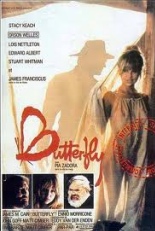
 Orson Welles shows up as a drunken judge and bloats all over the screen, delivering a wonderfully unintelligible performance that is so bitter and careless and drunk on Paul Masson, I doubt he knew the cameras were rolling. But maybe that’s just Matt Cimber’s charmingly free-flowing directorial style which, coincidentally, made him the Razzies’ pick for worst director that year. (That’s okay, Matt, the Razzies have been the stupidest award show since … well, ever. Consider the source.)
Orson Welles shows up as a drunken judge and bloats all over the screen, delivering a wonderfully unintelligible performance that is so bitter and careless and drunk on Paul Masson, I doubt he knew the cameras were rolling. But maybe that’s just Matt Cimber’s charmingly free-flowing directorial style which, coincidentally, made him the Razzies’ pick for worst director that year. (That’s okay, Matt, the Razzies have been the stupidest award show since … well, ever. Consider the source.)